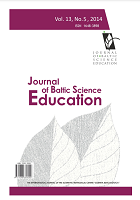A STUDY OF THE IMPACT OF HORTICULTURAL ACTIVITIES ON PRIMARY SCHOOL CHILDREN’S SELF-CONCEPT, WELL-BEING AND EFFECTIVENESS
A STUDY OF THE IMPACT OF HORTICULTURAL ACTIVITIES ON PRIMARY SCHOOL CHILDREN’S SELF-CONCEPT, WELL-BEING AND EFFECTIVENESS
Author(s): Mei-Lun Chen, Shi-Jer Lou, Wei-Fang Tsai, Chih-Cheng TsaiSubject(s): Psychology, Energy and Environmental Studies, Sociology, School education, Environmental interactions
Published by: Scientia Socialis, UAB
Keywords: horticultural activities; horticultural effectiveness; horticultural therapy; self-concept; well-being;
Summary/Abstract: This study adopts both quantitative and qualitative methods. There are 23 subjects in the experimental group and the control group. The experimental group received the “Green Giant Growth Group” test once a week for a total of 7 times. The measurement tools were scale of self-concept, Chinese well-being and horticultural effectiveness. With respect to data analysis, the researcher adopted descriptive statistics and analysis of covariance. Feedback and interviews were included in the qualitative analysis. According to the findings of this study, horticultural activities can enhance students’ self-concept, sense of control, self-satisfaction, sense of achievement and social skills. Based on the results of interviews, by participating in horticultural activities, students increase their interpersonal relationship skills. Their behaviors match social norms, and they are more responsible, open-minded and peaceful. In line with previous research findings, this study proposes suggestions for future researchers to apply horticultural activities in education or guidance.
Journal: Journal of Baltic Science Education
- Issue Year: 13/2014
- Issue No: 5
- Page Range: 637-649
- Page Count: 13
- Language: English

